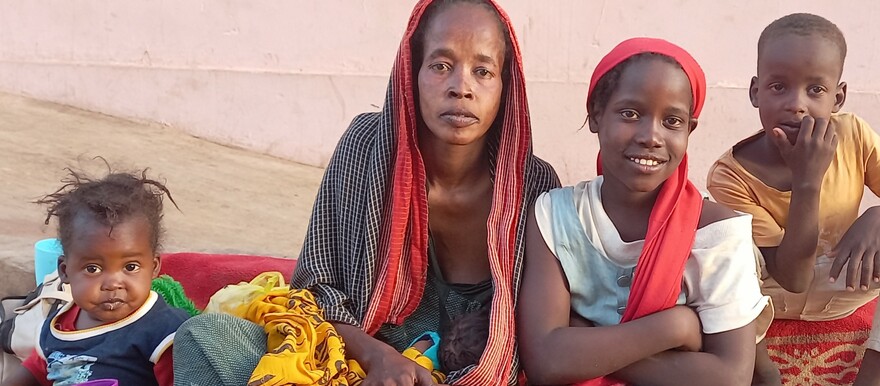Siham, a mother of five, has spent the last ten months lying on the floor of El Daein Hospital with her four children. They huddle together, using half a blanket as a mattress and the other half as a cover. Due to the lack of clothing, one of her sons has had to wear his sister’s pants.
My name is Siham Obaid Ahmed Ibrahim, and I am married with five children: Saleha, Salah, Hudhayfah, Jalal, and Fatimah. My son, Salah, was supposed to start first grade this year after graduating from kindergarten. My eldest daughter, Saleha, is currently in the fourth grade.
We used to live in Omdurman, specifically in the Al Salha neighbourhood of Al-Shegeilab area. I am a housewife, and my husband works as a blacksmith, specializing in knife-making. Our livelihood was dependent on his daily income, which provided us with food, drink, and covered the children’s education expenses. We were living day by day, and thankfully, our situation was relatively stable.
As the conflict escalated, bombs began raining down on neighboring houses, and military aircraft dropped explosive barrels in our area. Tragically, one barrel landed on our neighbour’s house, claiming the lives of four family members, including two children. Miraculously, the mother was not home at the time.
Amidst this chaos, criminal activities surged in the neighbourhood. Armed men invaded a neighboring house, committing murder and looting a truck. Subsequently, soldiers from the Army repeatedly entered our property through the fence, claiming to be searching for members of the Rapid Support Forces. My husband pleaded with them to use the front door or communicate with me to open the door for them.
One day, when my husband was delayed returning from work, armed men invaded our home and threatened us. Fearing for our safety, my husband suggested that we flee from Omdurman to our hometown in El Daein.
Our journey from Omdurman was fraught with peril. Traveling by bus, we encountered numerous bandits along the way, and soldiers halted passengers at every checkpoint for inspection. The arduous journey spanned 13 days, during which we faced financial strain. Food prices soared, ranging from 7,000 to 8,000 Sudanese Pounds per meal per person. Despite our hardships, compassionate fellow travellers on the bus shared their food with my children and me.
Upon our arrival in El Daein, we sought refuge with my husband’s relatives. However, due to their mistreatment and refusal to accommodate us, coupled with my illness and pregnancy, I had no choice but to seek medical treatment at the hospital. Taking my children with me, I was diagnosed with severe anaemia resulting from hunger and pregnancy, requiring a transfusion of four blood bottles. Consequently, I was admitted to the accident ward at El Daein Hospital.
Thanks to the El Daein Humanitarian Emergency Room Initiative, I received the blood I urgently needed. Subsequently, my health improved, and the dizziness subsided. The initiative also provided me with daily meals through a prepaid ticket from a nearby restaurant.
Additionally, they occasionally offered me cash to ensure a varied diet suitable for my pregnancy. Grateful for their humanitarian support, I chose to remain in the hospital. I am also deeply appreciative of the dedicated care provided by Dr. Jalal and Dr. Fatimah, who have played a significant role in my treatment and that of my children during their illnesses. It has been nine months since I was admitted to the hospital.
My heartfelt desire is for the cessation of war and the restoration of normalcy in our lives. I am resigned to the belief that wars are ultimately determined by fate. Unfortunately, I have lost contact with my husband since our departure from home, and I am left in uncertainty about his fate—uncertain whether he is alive or whether he fell victim to the turmoil in Omdurman.
Here in El Daein, I aspire to secure a furnished home equipped with beds and cooking utensils where my children and I can settle. I earnestly appeal to compassionate individuals to assist with the rental costs of such a residence.




